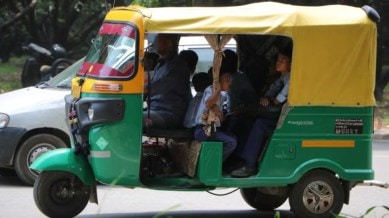Stay updated with the latest - Click here to follow us on Instagram
UT introduces fixed minimum fares for first 3 kms of travel
Ordinary auto-rickshaws and e-rickshaws will now charge Rs 50 for the initial three kilometres and Rs 13 for each additional kilometre.

The Chandigarh Administration has introduced fixed minimum fares for the first three kilometres of travel across all local taxis, auto-rickshaws, e-rickshaws, and bike taxis in the city by revising the fare structure.
The fare revision was officially notified by the Chandigarh Transport Department and is applicable immediately. This revision comes more than three years after the last fare hike, which was implemented on March 31, 2022.
monthly limit of free stories.
with an Express account.
The new fare structure, issued by the Transport Department through a notification dated July 7, 2025, also coincides with the formal enforcement of the Chandigarh Motor Vehicle Aggregator Rules, 2025, which aim to regulate both traditional and app-based transport services operating in the city.
For the first time, the Administration has introduced fixed minimum fares for the first three kilometres of travel for taxis, autos, and bike taxis. Earlier, fares were calculated based on the distance from the very first kilometre, but now passengers will be charged a flat minimum fare for the first three kilometres, regardless of whether they travel the entire distance or less.
This revision also merges the earlier separate fare structures of AC and non-AC taxis. Now, a 4+1 seater taxi, regardless of being AC or non-AC, will charge Rs 90 for the first three kilometres and Rs 25 for each subsequent kilometre. Similarly, a 6+1 seater taxi will charge Rs 100 for the first three kilometres and Rs 28 thereafter.
Ordinary auto-rickshaws and e-rickshaws will now charge Rs 50 for the initial three kilometres and Rs 13 for each additional kilometre. Prior to this, the autos charged Rs 19 for the first kilometre and Rs 9 for each subsequent one.
For the first time, the UT Administration has also notified formal fares for bike taxis, which will now charge Rs 30 for the first three kilometres and Rs 9 for every kilometre after that.
While the administration aims to offer fare stability to drivers and pricing clarity for commuters, reactions from stakeholders have been mixed.
Ramesh Ahuja, president of the taxi union, said the revised rates might not benefit taxi operators due to tough market competition.
However, Vikram Singh, president of the Tricity Cab Association, welcomed the step and said that the new fares would bring much-needed transparency to transport services.
He added that implementation must go beyond paper and be strictly enforced, particularly since aggregator companies have disregarded such guidelines in the past.